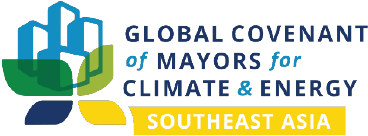Nongsamrong, Thailand | Community-Led Waste Management
Nongsamrong, Thailand
Date: July 5, 2023

Fast Facts
- Mayor: Seksun Phanawatthanawong
- Population: 28.716
- GCoM Signatory since 2016
- Nongsamrong is located in the Udon Thani Province which is known for its archaeological wonders where the world’s first bronze civilisation, dating back 5,000 years ago, was found in the area.
Background
Nongsamrong municipality has emerged as a leading example in the field of solid waste management. This recognition is reinforced by a learning exchange facilitated by UCLG ASPAC and UNESCAP, which aimed to share best practices with a municipality in Laos.
Solutions Implemented
In Nongsamrong, local leaders have developed a participatory waste management approach with a specific focus on organic waste. The objective of this initiative is to encourage community members to engage in transformative behaviour by transforming organic waste into compost using earthworms. This not only helps reduce the volume of waste going to the final disposal site but also promotes the sustainable use of organic resources.
An innovative recycling fund has been established to encourage active community participation in waste management. Community members are encouraged to apply for membership, which entails entering into a legally binding Memorandum of Understanding (MoU) with the municipality. According to the terms outlined in the MoU, the municipality agrees to purchase the compost produced by community members.
The municipality plays a vital role as a mediator and facilitator, seeking opportunities in the market to sell compost. This collaborative approach establishes a mutually beneficial partnership between the government and the community for the sake of a sustainable environment. The government saves money on waste management while also gaining access to compost at a lower price than the market. On the other hand, the community gains financially, which helps to improve their economic situation.
This reciprocal relationship between the government and the community highlights the importance of collective efforts in achieving sustainable waste management and environmental preservation. The participatory approach, reinforced by the incentive of the recycling fund, fosters a sense of ownership and responsibility among community members, leading to a more efficient and effective waste management system in Nongsamrong.
Results and Solutions Learned
Despite population growth, the waste management practice in Nongsamrong successfully reduced waste production from 22 to 16 tons per day within five years.[1] Active community participation, supported by frequent dialogues and hearings, played a pivotal role in this achievement. The practice’s success led to its inclusion in the National Agenda of the Solid Waste Road Map, inspiring other municipal mayors to engage their communities in waste management efforts. Political support further underlined the necessity of mutual agreement and environmental concern, highlighting the practice’s significance and encouraging its replication nationwide. This model highlights the power of collaboration, community engagement, and political endorsement in achieving sustainable waste management.
[1] Konrad Adenauer Stiftung, “Design for Success: Best Practices in Local Waste Management,” from https://www.kas.de/documents/252038/253252/7_dokument_dok_pdf_47622_1.pdf/f99f102a-3f8c-d280-3cb4-fffe6ee804ca?version=1.0&t=1539649711714






